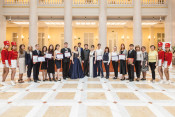
The results of the VIII Annual School Olympiad "Russia in the Electronic World" were summed up in the Presidential Library
The Presidential Library hosted a solemn awarding of winners and prize-awardees of the school Olympiad in history, social studies and the Russian language "Russia in the Electronic World".
188 students from 44 regions of Russia participated in the third and final stage of the Olympiad, 31 of them became winners: 15 people in history, 18 in social studies, and 6 in Russian. Schoolchildren from all over the Russian Federation have achieved success: St. Petersburg, Moscow and the Moscow region, Krasnoyarsk, Lipetsk, Rostov-on-Don, Irkutsk, Kursk, Yekaterinburg, Tver, Volgograd, Ryazan, Barnaul, Izhevsk, Kazan, Chelyabinsk and Chelyabinsk Tula and Tula region, Tambov and Tambov region, as well as Kaliningrad and Tyumen regions.
In the videoconference mode, the winners and prize-awardees of the Olympiad on a remote site in the Reserve Center of the Presidential Library in Moscow took part in the solemn ceremony.
"We are living in an information age", - said before the ceremony of awarding Pavel Fedorov, the chief research officer of the Presidential Library, deputy chairman of the organizing committee of the Olympiad, "and those who know how to work with information compete freely and are guided in its search. It is necessary to ensure that the Internet worked for you, because in the network, as you know, there is a "wild field" that does not develop, leads to the side. We encourage you to work with proven sources of knowledge and, on our part, will do our best to provide equal information opportunities to all those who wish".
Diplomas of the I degree in history were awarded in St. Petersburg: Valeria Contreras Koob (School № 506 in St. Petersburg), Fedor Roslyakov (Second St. Petersburg Gymnasium), Ivan Serkin (Izmailovo School № 1508, Moscow), Yekaterina Tumakova (School № 234, St. Petersburg), Daria Yatskevich (Classical School of Guryevsk, Kaliningrad region). In Moscow, diplomas were given to Anastasia Kukovenko (Vidnovskaya secondary school № 10 in Vidnoye, Moscow region) and Alina Kazandzhi (Lyceum of the Higher School of Economics, Moscow)
Many winners could not participate in the award ceremony. They are Sergey Grigoryan (Krasnoyarsk University Gymnasium № 1 - Univers), Ulyana Zhigailo (MBOU of the Balashikha City District "Gymnasium №11" of the Moscow region), Yekaterina Kozelkova (School No. 65 Spectrum, Lipetsk), Irina Missal (Gymnasium №80, Chelyabinsk), Ilnur Osmanov (Lyceum-boarding school №2, Kazan, Republic of Tatarstan), Vladislav Semakhin (Lyceum-boarding school № 2, Kazan, Republic of Tatarstan), Maxim Fetisov (LOE "Lyceum KEO", Rostov-on-Don) , Alexandra Kholomova (School № 30, Kursk).
All winners and prize-awardees who were not able to attend the award ceremony diplomas will get their diplomas by mail.
"Social Studies" discipline diplomas of the I degree were awarded: in St. Petersburg - Alexandra Vaisberg (Lyceum № 369, St. Petersburg), in Moscow - Julia Voropaeva (School № 1286, Moscow). Diploma II degree was awarded to Nadezhda Makova (St. Petersburg City Palace of Young Creativity).
Diplomas of the I degree will be sent to Maria Barsukova (Humanities and Law Lyceum № 86, Izhevsk, Udmurt Republic), Alexey Barykin (Gymnasium № 9, Yekaterinburg), Tatiana Vervain (secondary school № 127, Barnaul), Anna Gorshkova (Lyceum № 77, Cheboksary), Alexandra Grachyova (School № 17 with in-depth study of the mathematics, Tver), Artem Kasumyan (Education Center № 1, Donskoy, Tula region), Polina Nikitina (School № 17 with in-depth study of mathematics in Tver), Ilnur Osmanov (Lyceum-boarding school № 2 in Kazan, Republic of Tatarstan), Vlad Poznyak (Anthem Zia № 26 Miass, Chelyabinsk region), Alexei Fedotov (AOR № 17 with in-depth study of mathematics, Tver) and Vladislava Shaydullina (College № 3, Volgograd). Diplomas of the II degree - Polina Antonova (Gymnasium № 2, Yekaterinburg), Semyon Svintsov (School № 10 named after P. A. Ponomarev in Irkutsk), Anastasia Seryogina (Education Center № 20 in Tula) and Tatyana Khlystova (School № 53, Ryazan).
The winners of the Russian language Olympiad Tatyana Khlystova (School № 53, Ryazan), Polina Kobzeva and Anna Yuryeva (Michurinsky Lyceum of Michurinsk, Tambov Region) could not attend the awards ceremony, but soon they will be awarded diplomas of the I degree. Nadezhda Zhukova (department of profile pre-university training of Tambov State University named after G. R. Derzhavin") and Elena Maslieva (Novoseleznevskaya secondary school in Novosieleznevo, Tyumen region) will receive II and III degrees, respectively.
At the celebrations on the same day, II and III degrees in Russian were awarded to Yulia Voropaeva (School № 1286, Moscow) and Alina Kazandzhi (Liceum NIU HSE in Moscow), and in St. Petersburg - to Anastasia Lapteva (Gymnasium № 261, St. Petersburg) and Olesya Chizheva (Gymnasium N 155, Yekaterinburg).
Olympiad for schoolchildren "Russia in the Electronic World" - a large-scale project, which is held by the Herzen State University of Russia together with the Presidential Library and the Main Scientific Research Computing Center of the Presidential Administration of the Russian Federation. On history and social studies, it is included in the Order of Olympiads of schoolchildren, approved by the Ministry of Education and Science of the Russian Federation, which gives its winners and prize-awardees the right of preferential admission to universities. Winners and prize-awardees on the "Russian language" discipline will be granted with additional points upon admission to the Herzen State Pedagogical University of Russia.
More than 5,200 schoolchildren from all 85 constituent entities of the Russian Federation, as well as seven foreign countries: Algeria, Ukraine, Belarus, Uzbekistan, Tajikistan, Kyrgyzstan and Kazakhstan participated in this year's Olympiad, which has been held for the eighth time.
In total, starting from 2010, about 33 thousand pupils of the 10th-11th grades took part in the project, which aims to attract pupils to sources on the history of Russia, the theory and practice of Russian statehood.









